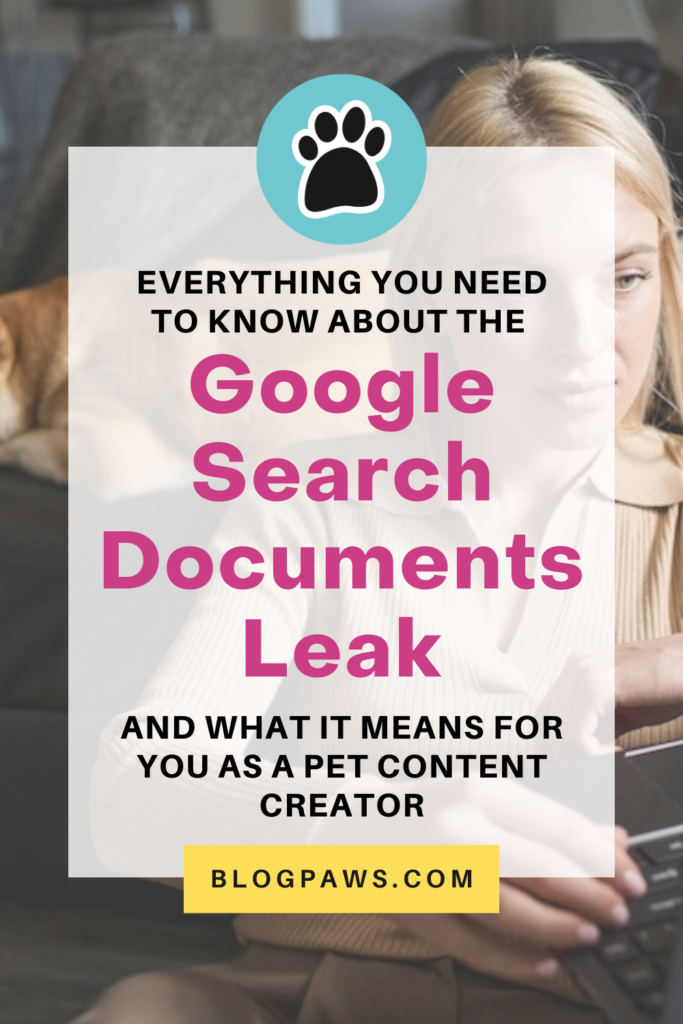Google Search Documents Leak – What Does This Mean for You?
The recent leak of Google’s internal search documentation has been all the buzz in the marketing world recently. Content creators and small business owners are scrambling to understand what this means for their marketing efforts, while many top “gurus” are coming out of the woodwork with interpretations and proposed answers.
For the average Joe, the documents are a lot—over 250 pages of API files (if printed) a lot…
But don’t worry; we’re not expecting you to read through all that documentation. In fact, I have done precisely that for you. After spending a few days reading through the documentation line by line, I want to share what we DO know based on these documents, what remains a mystery, and how you can leverage this information to boost your online visibility.
Let’s get started…
What Happened and What Was Leaked?
If you are hearing about this document leak for the first time, my introduction may be a little confusing. So, let’s start at the beginning and address what was leaked and how we know it’s real.
On March 13th, Rand Fishkin, SparkToro co-founder, revealed that thousands of documents were leaked from Google’s internal Content API Warehouse by an automated bot. These documents reveal ranking factors and considerations used by Google’s algorithm to determine what content to deliver in search results.
To give you an idea of the magnitude of the leak, the documents included 2,596 modules and 14,014 attributes.
The leaked documents are a blueprint for the code used by the search algorithm. Modules identify specific elements and attributes further define and describe the module. It’s important to note that just because a module exists doesn’t mean that it has significant weight in the algorithm. We know of its existence, but not if it’s importance or value
While there was a lot of skepticism in the beginning (understandably), Google has since confirmed the documents are real to reporters. However, they have cautioned those reading the documentation about jumping to conclusions based on incomplete or out-of-context information.
What does this mean? The information that was leaked IS real, but there isn’t enough data available to fully explain Google’s search algorithm.
What Do We Know About the Leaked Documents?
We don’t have the magic answer to all things Google, although we would all love it if that were true! However, the documentation does reveal some interesting information that gives us a little insight and understanding about factors that can impact your search ranking.
Here are a few points that I believe are important to understand as a small business owner or content creator in the pet industry:
Google Does Have an Overall Site Quality Score
One statement Google officials have made in the past when pressed by marketers is that they do not consider “Domain Authority” in their search algorithm.
Domain Authority is a ranking created by Moz that is often used by bloggers and brands interested in collaborating with bloggers to compare site quality from one site to another. Based on Moz’s third-party information, it offers insight into the likelihood that one blog can outrank another in search queries.
While Google doesn’t use the rank system Moz created, the documents reveal that they have their own version of this called “SiteAuthority.”
Author Information is Considered
One piece of information the API shows is that Google is looking at is the author’s information. Not only does it look at the author associated with a website, but it also looks at whether that author is responsible for each page.
This doesn’t guarantee that including author bylines on your articles will improve search ranking, but it does show that they are at least looking at this information.
Click Signals and User Behavior Matters
I have been making this point for quite some time now, but we now have written confirmation that this information has at least been collected.
Click signals refer to what users do after searching for a Google query. Which sites do they click on? Do they stay on one site or return to click on another? This information provides insight into which websites provide searchers with the information they seek and which fall short.
The leaked documentation listed several factors related to click-based measurement, such as:
- Bad clicks
- Good clicks
- Last longest clicks
What does all this mean, and how can it impact your ranking? There is still a lot open to interpretation here. The documents don’t provide any clear definitions of each term or how they are potentially applied to search ranking. However, it offers some insight into how the algorithm may look at click activity.
For example, by looking at the “last longest clicks,” it shows that they are considering which link they clicked and stayed on to complete their search – aka, which content gave them the information they needed.
It highlights the importance of focusing on search intent and creating a good user experience so they will stay on your site, read through your content, and find what they are searching for on your website.
Links Still Play a Role
This topic has caused much debate in the SEO world. While some SEOs say link building is essential, others say it no longer impacts search performance. Google has gone on record to say it’s no longer one of the “top 3 ranking factors.”
However, the leaked documents show that links still have a place in our SEO efforts. That said, a section of the documentation indicated that internal links may not hold the weight they once did.
Fresh Content is Important
One interesting thing I noticed when reading through the documents was the importance Google placed on the dates associated with the content. This included noting the set date on the page, the date extracted from the URL or in the title, and the date derived from the page content.
There is no explanation of how this comes into play, but with several touchpoints focused on connecting a date with the content, it’s clear that Google believes this is important in some way.
Another interesting point was the history of your content as it applies to Google. Simply updating and changing dates on an article won’t undo past mistakes. In fact, when considering data, Google looks at the last 20 versions of any page.
Updating content is great, but it won’t be a quick fix for poor content choices.
In the past, content creators would simply update the date on an article and maybe make a few minor tweaks, which would satisfy the belief that it was “fresh content.” However, the documents revealed Google is looking at the “last significant update of the page content.” Take note of the second word of that statement – SIGNIFICANT. This means you have to actually update the content for Google to consider your content fresh.
What is Still a Mystery?
One of the biggest mysteries that still exists is how these various attributes are weighted and applied to the ranking process. For example, one attribute could be heavily weighted and significantly impact your search performance, while another may barely make a difference. Without knowing this piece of the puzzle, we are left to speculate which attributes are most important.
It’s also important to note that these API documents are not code used directly by Google’s algorithm. Instead, they are documents used by developers when working on and building Google’s systems. This means nothing you’re reading here is final or guaranteed, even if there was a proposed ranking to how the attributes compare.
Another point that has triggered a lot of discussion, largely speculation, has been the inclusion of Product Reviews as a demotion. Does this mean Google doesn’t like product reviews?
Given that we recently experienced a significant Google update focused on the quality of this type of content, there is a good chance this simply refers to how that is applied. However, like every other conclusion we reach while analyzing these documents, that could be incorrect.
In short, we have been given insight and pieces of the puzzle, but not enough to see the complete picture. SEOs and marketing specialists can draw well-educated conclusions, but there is no guarantee, and we know Google isn’t jumping to give us the rest of the equation.
What Does this Mean for Content Creators and Small Business Owners?
That’s a lot of technical information about Google and its search algorithm. However, unless you geek out over SEO topics (like I do), you’re likely sitting there saying – “Yes, but what does it mean for me?”
Having this insight into what information Google collects and potentially uses to determine what content is shown in their search results can help direct your SEO efforts. Of course, as I stated, this all involves some level of interpretation and speculation… As is always the case with SEO, there is no guarantee.
However, looking at your content through the lens of the attributes in these leaked documents can help set you up in a way that increases your chances of appealing to Google’s algorithm. Here are a few steps you can take, based on this information, to increase your chances of success:
Pay Attention to Site Quality
Factors long associated with growing your Domain Authority are worth considering in your SEO efforts today. This means ensuring that your site offers a good user experience and showing the Google algorithm that you are an authority in your niche.
One way to establish that your website is seen as an authority is by getting links back to your website from high-quality websites. There are several ways you can work on earning backlinks or at least increasing your chance of being considered for them as a content creator or small business owner:
- Be a podcast guest, offer expert quotes, or write guest posts for quality websites
- Ensure your website runs quickly and looks professional
- Create linkable content like infographics, first-hand data (running your own surveys and studies), and content that adds something new to the conversation
Include Author Bylines
This one may or may not help – but it’s a quick and easy step to take. We know Google isn’t going to confirm or deny the conclusions SEOs are drawing from these documents, so it may be best to err on the side of caution. With the documents showing the author is tracked and associated with content, take a moment to add an author byline that makes clear who you, as a content creator, are.
If you are using WordPress, many themes will allow you to easily set it so these bylines are pulled directly from the user portfolios in your WordPress dashboard. This means that, once set up, you won’t have to worry about adding them to each article. As long as you are listed as the author, it will automatically share your byline.
Quality is Key
SEOs (like me) have been saying this for years. Don’t get lost in trying to appeal to every ranking factor and technical SEO consideration when creating content. Instead, create high-quality content that gives your readers the information they are looking for.
The importance of this can be seen in the click signals and user behavior metrics. If someone is searching for an answer, comes to your website, and instantly clicks away, that shows Google that you aren’t offering anything of value to people searching that word or phrase. Instead, you want to provide easy-to-navigate, easy-to-read, and valuable information that draws people in and keeps them on your website while giving them the answers they are searching for.
Try to avoid unnecessary fluff that could bore them or hide the answers. Other factors that could negatively impact your site include:
- Too many ads or pop-ups (I’m not saying eliminate ads, just keep the user experience in mind)
- Small or hard-to-read fonts
- Bright colors that could hurt the eyes
- Spelling and grammar errors that make readers question the quality of your content
- Broken links
- Links to poor quality or irrelevant content
Final Thoughts About the Google Document Leak
If the hysteria surrounding the Google document leak has you stressed out, take a deep breath – it will be okay! Most of the information I have shared with you isn’t new! These are concepts that SEOs have been trying to highlight after every update and upheaval.
The most important thing to remember is that there is no definitive answer coming out of this leak. Be cautious if someone is trying to sell a course or coaching that promises “the secret to Google” from allegedly reading these documents. Instead, let’s take what we can infer from the information they include and continue to focus on the most important thing we do as content creators – publishing high-quality content we can be proud of!
About the Author: Britt Kascjak, BlogPaws Director of Content & SEO, is an award-winning freelance writer whose background in digital and social media marketing spans 15+ years. She’s been a content creator in the pet industry for 9+ years with her own blogs: Shed Happens, The Kas Pack, and Lucifer the Rescue Pup where she shares her life and outdoor adventures with her 2 dogs and 3 cats. Read more…





